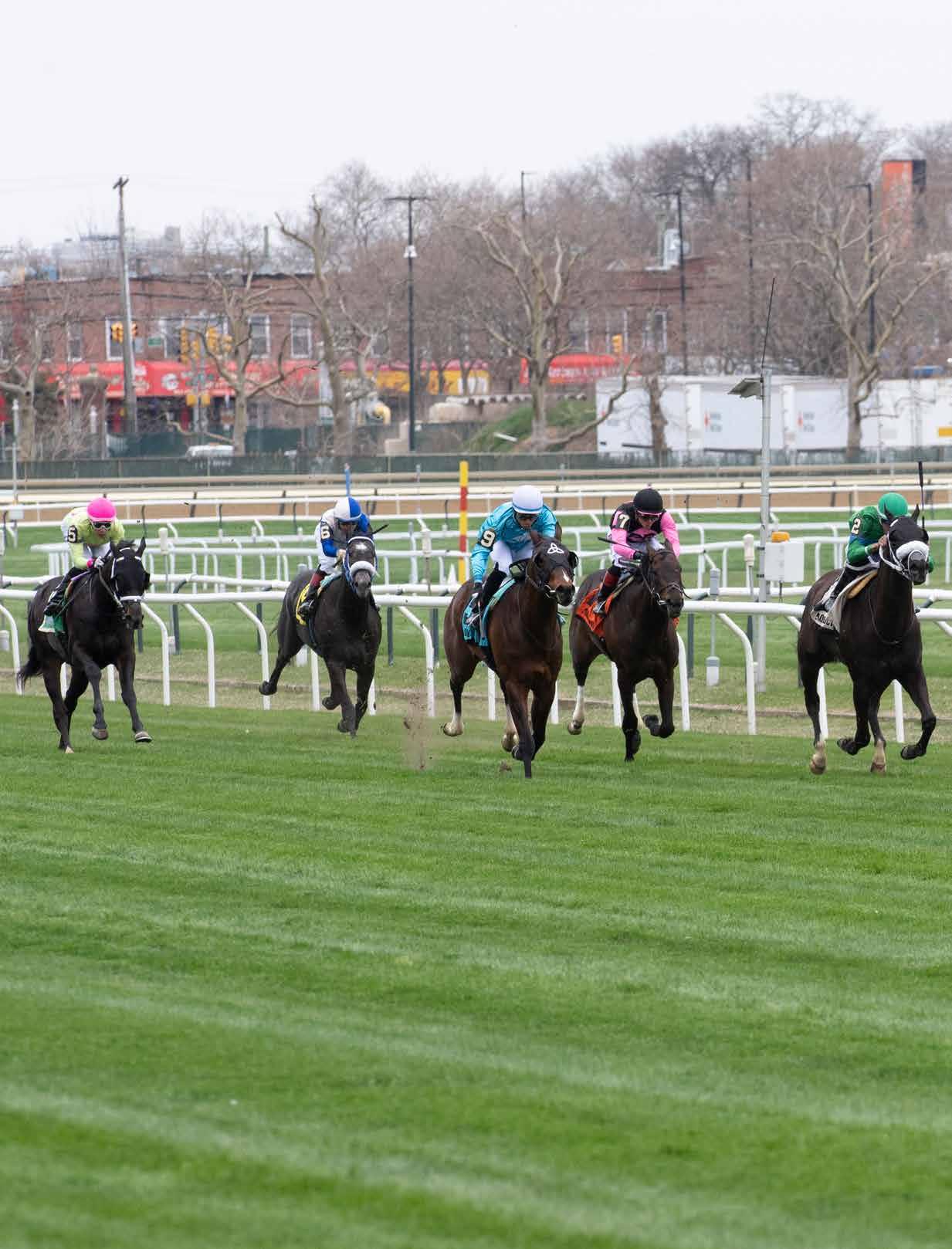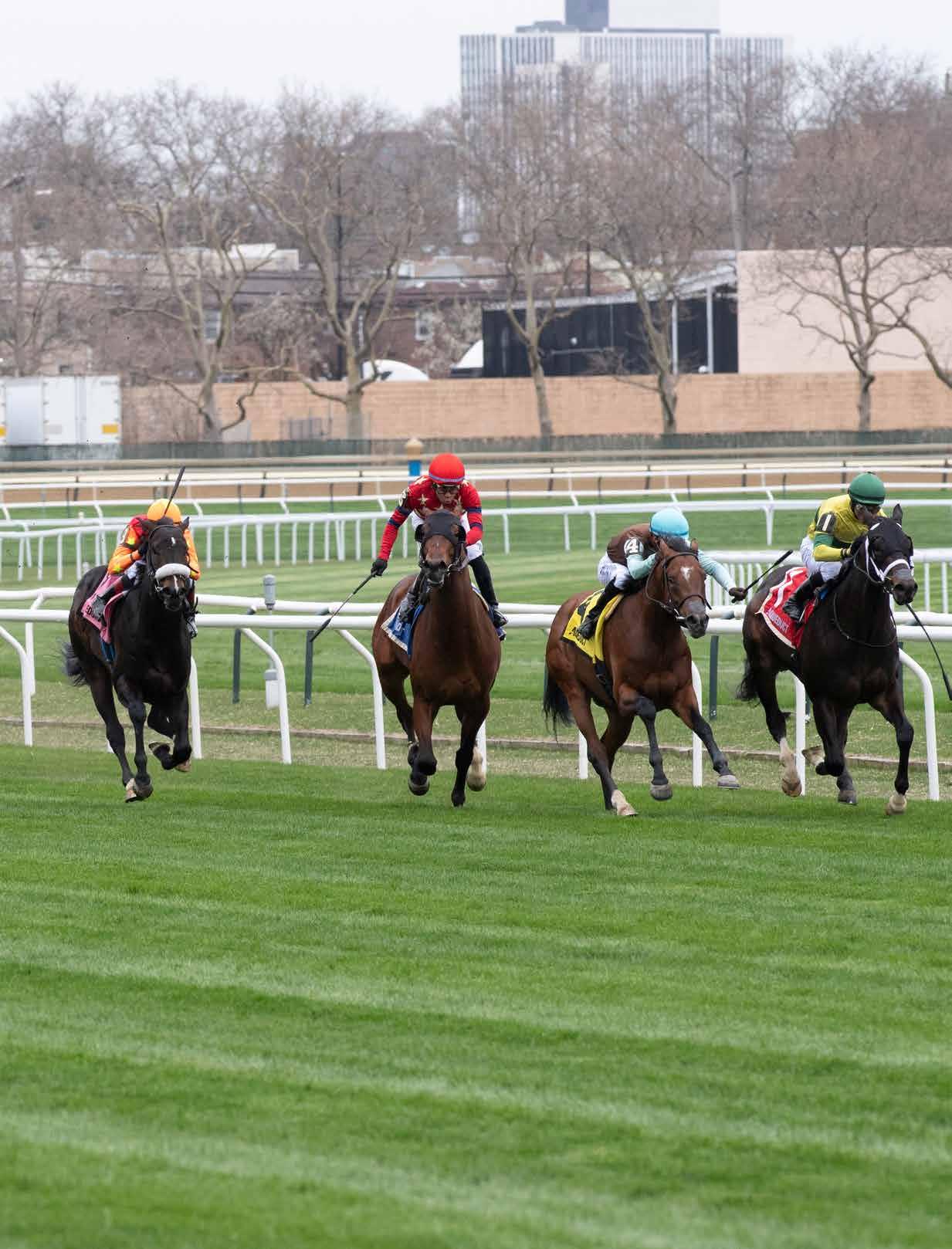
7 minute read
HISA Adjudication System: It’s not your state stewards’ hearings anymore
By Peter J. Sacopulos, JD
The rollout of the Horseracing Integrity and Safety Authority (HISA) rules has been bifurcated, with the Racetrack Safety Program starting July 1, 2022, and the Anti-Doping and Medication Control rules becoming effective May 22, 2023.
The implementation of these rules—with some provisions subject to “enforcement discretion,” or clarification by the Authority after their adoption, and absent the states of West Virginia, Louisiana, Texas and Nebraska— has been presented in articles and in the news. While some time and attention have been devoted to the differences between the preexisting and new rules, little attention has been spent on the HISA rules regarding adjudication of alleged medication violations. These rules and procedures are unrecognizable from the administrative system traditionally used by state regulators.
Prior to HISA, the disciplinary process was initiated either by a ruling issued by the racetrack stewards or when an administrative complaint was issued by the state racing commission/regulators. In most jurisdictions, the process included four steps, as follows:
Disciplinary Process Before State Regulators for Ruling Issued by Stewards/Judges
Step 1
• Licensee receives notice of a violation and is presented with a proposed penalty and the opportunity for a hearing.
• If a hearing is requested, a stewards/judges hearing will be conducted and a penalty issued.
• Licensee can appeal the ruling but must do so within a certain time frame (usually less than 30 days).
Step 2
If a notice of appeal is filed, an administrative law judge is appointed to conduct a hearing on the merits (witnesses/evidence).
• Discovery process is conducted, and depositions usually are taken.
• Hearing is conducted before an administrative law judge, who then makes a recommended decision to the full state commission/regulatory agency.
Step 3
Licensee is given an opportunity to argue their position before the state commission/regulatory agency. A decision is made to either accept, modify or reject the recommended decision of the administrative law judge.
Step 4
Licensee may accept the decision issued by the state commission/regulatory agency or file a petition for judicial review with the appropriate trial court in that state.
• A petition for judicial review asks the court to review the decision issued by the state commission/regulatory agency.
• The trial court can only overturn a decision from the state commission/regulatory agency if the decision is:
• Arbitrary, capricious, an abuse of discretion or otherwise not in accordance with the law;
• Contrary to constitutional right, power, privilege or immunity;
• In excess of statutory jurisdiction, authority or limitations or short of statutory right;
• Without observance of procedure required by law; or
• Unsupported by substantial evidence.
Disciplinary Process Before State Regulators for Administrative Complaint Issued by State Regulators
Step 1
• Licensee receives notice that the state regulator (commission) has charged them with a violation(s) via the issuance of an administrative complaint. Licensee is presented with a proposed penalty and the opportunity for a hearing.
• Licensee can accept the proposed penalty or contest the complaint and request a hearing.
Step 2
If a hearing is requested, an administrative law judge is appointed to conduct a hearing on the merits (witnesses/evidence).
• Discovery process is conducted, and depositions usually are taken.
• Hearing is conducted before an administrative law judge, who then makes a recommended decision to the full state commission/regulatory agency.
The differences in the HISA/HIWU (Horseracing Integrity and Welfare Unit) adjudication system are clear in the case of an alleged medication violation. The HISA rules contain two classifications of medication violations—controlled medication rule violations and anti-doping rule violations—and the adjudication process differs for each classification type. This is how the HISA/HIWU adjudication system for medication violations works:

• Notification of positive finding with an equine controlled medication (ECM) notice
• The covered person may either provide an explanation and/or admit the violation and accept sanction or request a split sample.
• If the positive is not confirmed, the test is deemed negative, the covered person is reimbursed, and the ECM notice is withdrawn.
• HIWU will issue a charge letter that includes sanctions if:
• Analysis of the split sample is waived;
• The second laboratory confirms the initial positive finding;
• The submitted explanation does not excuse the violation; or
• The deadline to submit an explanation has passed.
• The covered person has seven days to admit violation and accept sanctions or request a hearing.
• An expedited timeline can be requested if the covered person is likely to race within 45 days and if no provisional suspension is in effect.
• If a hearing is requested, the matter is assigned to an internal adjudication panel of up to three members.
• The panel consists of a group of 15 to 20 members selected by HISA and HIWU based on their previous equine regulatory experience.
• The members are appointed on a rotating basis.
• The panel may issue a decision based on written submission from both sides or require a hearing to be held.
• The covered person can request that the written submission requirement be waived.
• If the covered person does submit a written submission, it must be done within seven days of submitting a request for hearing.
• HIWU is then given seven days thereafter to submit its response to the covered person’s written submission.
• The panel then issues a decision within 14 days of the last written submission or 14 days after the completion of a hearing.
• If the covered person wishes to do so, they may file an appeal of the panel’s decision with the Federal Trade Commission within 30 days of the issuance of the decision.
• The FTC then assigns an administrative law judge to conduct a de novo review of the panel’s decision.
• If the covered person wishes to do so, they may elect to request the full FTC review of the administrative law judge’s decision. However, the FTC is not required to conduct another review at this point.
• Should the FTC elect not to conduct another review, the covered person may appeal to the United States Court of Appeals.
A covered person should understand the new HISA/HIWU rules governing adjudication of alleged medical violations and that the prospect of defending an alleged violation is not only different but more costly. A covered person will need to retain counsel as well as an expert witness, and they are required to pay for a translator (if needed) and a portion of the arbitration cost. Also, the covered person is required to pay for a court reporter to ensure there is a record, which is required for purposes of appeal.
Perhaps the most critical difference for the covered person involves the right to review.
No longer may the licensee/covered person appeal a final administrative order to a state court that is in their community or a neighboring community. Instead, the ultimate administrative authority, the Federal Trade Commission,
• Notification of positive finding with an equine anti-doping (EAD) notice and issuance of a provisional suspension
• The covered person may either provide an explanation and/or admit the violation and accept sanction or request a split sample.
• If the positive is not confirmed, the test is deemed negative, the covered person is reimbursed, and the EAD notice is withdrawn.
• HIWU will issue a charge letter that includes sanctions if:
• Analysis of the split sample is waived;
• The second laboratory confirms the initial positive finding;
• The submitted explanation does not excuse the violation; or may or may not accept the covered person’s request for review. If the request for review is denied, the covered person’s right to appeal is directly to a U.S. Court of Appeals. Logistically, this is more challenging. Take, for example, a covered person who has an alleged violation in Texas. They must now pursue an appeal before the Fifth U.S. Circuit Court of Appeals in New Orleans. A person who has allegedly committed a medication violation in Puerto Rico must pursue an appeal before the First U.S. Circuit Court of Appeals in Boston. Also, and significantly, the estimated legal cost for a trip to the U.S. Court of Appeals is in excess of $25,000.
• The deadline to submit an explanation has passed.
• The covered person has seven days to admit violation and accept sanctions or request a hearing.
• An expedited timeline can be requested if the covered person is likely to race within 45 days and if no provisional suspension is in effect.
• If a hearing is requested, the matter is assigned to an arbitral body of up to three members.
• The arbitral body is chosen and appointed by Judicial Arbitration and Mediation Services and Alternative Dispute Resolution Services from a panel of retired lawyers and judges who have experience in anti-doping and sports adjudication.
• The members are appointed on a rotating basis.
• The covered person submits a pre-hearing written submission within 14 days of submitting a request for hearing.
• HIWU is given 14 days thereafter to submit its response to the covered person’s written submission.
• A hearing is conducted within 60 days of the hearing request.
• The arbitral body then issues a decision within 14 days of the completion of a hearing.
• If the covered person wishes to do so, they may file an appeal of the arbitral body’s decision with the Federal Trade Commission within 30 days of the issuance of the decision.
• The FTC then assigns an administrative law judge to conduct a de novo review of the arbitral body’s decision and issues its own decision.
• If the covered person wishes to do so, they may elect to request the full FTC review of the administrative law judge’s decision. However, the FTC is not required to conduct another review at this point.
• Should the FTC elect not to conduct another review, the covered person may appeal to the United States Court of Appeals.
In conclusion, The new HISA/HIWU rules and regulations regarding governing adjudication of medication violations are very different, and the price of due process has gone up—way up. HJ










